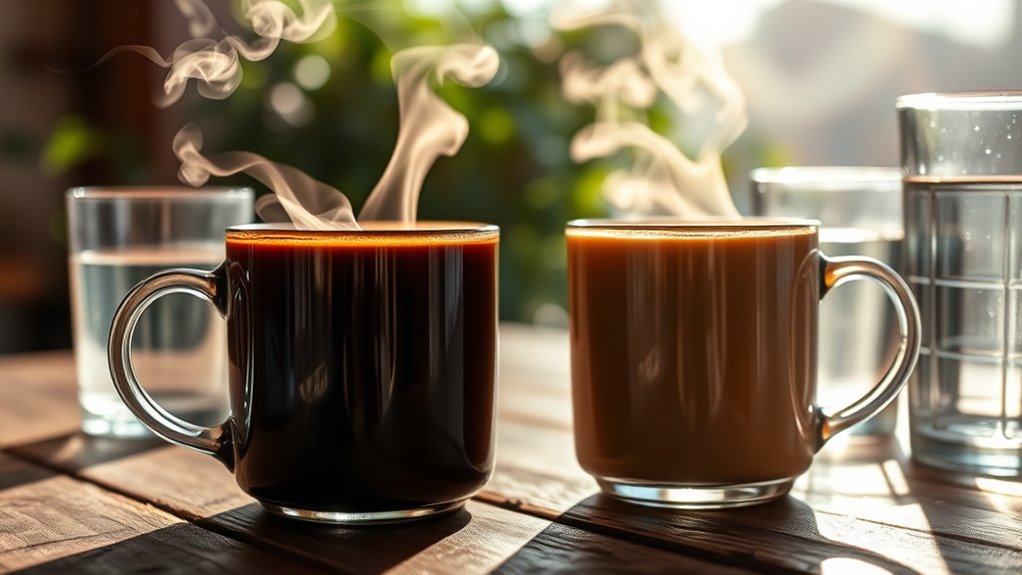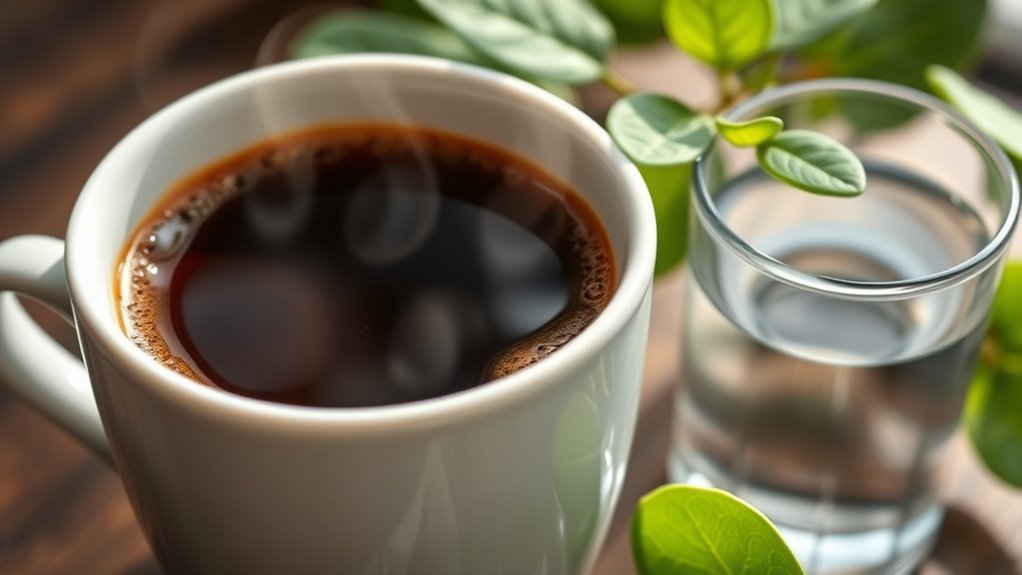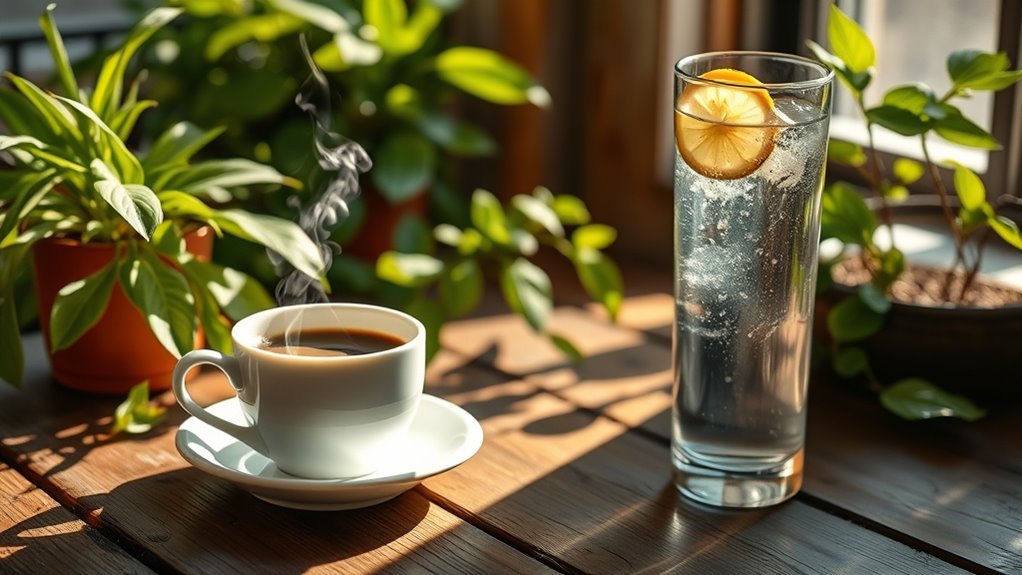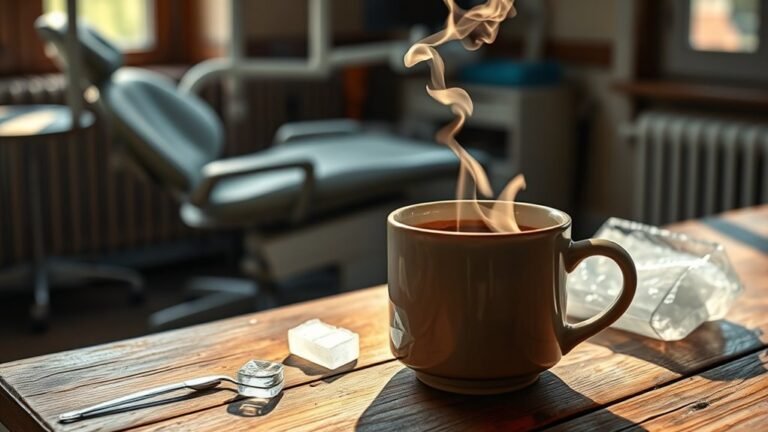Can Decaffeinated Coffee Dehydrate You
No, decaffeinated coffee won’t dehydrate you. It still contributes positively to your fluid intake, just like regular coffee. While some may worry about caffeine’s diuretic effects, decaf contains minimal caffeine, making dehydration unlikely. The water content in decaf helps keep you hydrated. It’s a great option if you’re looking for flavor without the caffeine jitters. Discover more about decaf’s hydration benefits and other factors that affect your coffee choices.
Understanding Caffeine and Diuretics

While many people enjoy their daily cups of coffee, it’s important to understand how caffeine functions as a diuretic. Caffeine effects can vary from person to person, but its diuretic properties are well-documented. When you consume caffeine, it prompts your kidneys to filter more sodium, causing an increase in urine production. This doesn’t necessarily mean you’ll become dehydrated, especially if you’re a regular coffee drinker, as your body often adapts to caffeine over time. However, if you’re sensitive to its effects or consume it in large quantities, you might notice increased urination. Staying aware of how caffeine interacts with your body can empower you to enjoy your coffee while maintaining proper hydration. Balance is key in your daily routine.
The Science Behind Decaffeination
Decaffeination is a fascinating process that removes caffeine from coffee beans while preserving much of their flavor and aroma. There are several decaffeination processes, including the Swiss Water Method, which uses water to extract caffeine while maintaining the beans’ integrity. Another popular method involves using solvents like ethyl acetate, which selectively remove caffeine. Each technique has its pros and cons, but they all aim to retain the coffee’s essential qualities. The health benefits of decaffeinated coffee are notable; it can be gentler on your stomach and may lower the risk of certain diseases, such as type 2 diabetes. By understanding the science behind decaffeination, you can make informed choices about your coffee consumption while enjoying its rich flavors without the jitters.
Comparing Hydration: Caffeinated vs. Decaffeinated Coffee

When it comes to hydration, many people wonder how caffeinated and decaffeinated coffee compare. Studies show that both types can contribute positively to hydration levels. While caffeinated coffee does have a mild diuretic effect, it’s often overstated; moderate consumption doesn’t lead to dehydration. On the other hand, decaf offers similar hydration benefits without the caffeine’s slight drawbacks. If you’re sensitive to caffeine or just prefer a lower stimulant intake, the decaf benefits can be significant. Ultimately, whether you choose caffeinated or decaffeinated coffee, both can keep you hydrated when consumed in moderation. So, enjoy your cup of joe, knowing it can help you stay adequately hydrated throughout the day.
The Role of Other Ingredients in Coffee
When you add creamers, sugars, or flavor enhancers to your decaffeinated coffee, it can impact your overall hydration levels. These additional ingredients can contribute calories and alter the drink’s hydrating properties. Understanding how these components interact with coffee is essential for making informed choices about your beverage.
Added Creamers and Sugars
Many coffee drinkers enjoy customizing their brews with added creamers and sugars, which can greatly impact both flavor and health. Different cream types, like whole milk, almond, or oat milk, can alter not just taste but also caloric content and nutritional value. Sugar alternatives, such as stevia or monk fruit, provide sweetness without the calories.
| Cream Types | Sugar Alternatives |
|---|---|
| Whole Milk | Stevia |
| Almond Milk | Monk Fruit |
| Coconut Cream | Agave Syrup |
When you choose your creamers and sugars wisely, you can enhance your coffee experience while being mindful of health. Balancing indulgence with nutrition helps you enjoy your coffee without guilt.
Flavor Enhancers and Hydration
How can the addition of flavor enhancers affect your hydration while enjoying coffee? Flavor enhancers, like syrups or spices, can transform your coffee’s flavor profiles but may also influence your hydration balance. Some ingredients, such as sugar, can lead to increased thirst, while others, like milk or almond milk, can add hydration. However, it’s important to take into account that overly sweet or creamy additions might counteract the hydrating effects of decaffeinated coffee. Moderation is key; balancing the flavors you love with the need to stay hydrated is vital. Keep an eye on how these additives impact your overall fluid intake, ensuring you’re enjoying your coffee without compromising your hydration levels. Choose wisely, and savor your coffee experience!
Studies on Decaf Coffee and Hydration

While you might think that all coffee contributes to dehydration, recent studies suggest that decaffeinated coffee can actually have a neutral or even positive effect on hydration levels. Here are some key findings from hydration studies on decaf coffee:
- Fluid Intake: Decaf coffee contributes to your daily fluid intake, helping maintain hydration.
- Electrolyte Balance: It can support electrolyte balance, which is vital for overall hydration.
- Mild Diuretic Effect: Though it has a mild diuretic effect, research indicates this doesn’t greatly impact hydration.
Incorporating decaf coffee into your routine may not only satisfy your caffeine cravings but also support your hydration efforts. So, if you love coffee, enjoy your decaf knowing it’s not working against your hydration goals!
Myths About Decaf Coffee and Dehydration
Is it true that decaffeinated coffee dehydrates you? Many people hold decaf misconceptions, believing that the lack of caffeine means it’s less hydrating. In reality, hydration facts show that decaffeinated coffee contributes to your daily fluid intake just like regular coffee. While caffeine can have a mild diuretic effect, the amounts in decaf are minimal, making it unlikely to lead to dehydration. Studies reveal that the water content in decaf still aids in maintaining hydration levels. So, if you enjoy a cup of decaf, you’re not compromising your hydration. Instead of fearing dehydration from your favorite brew, embrace decaf as a tasty, hydrating option that can fit seamlessly into your lifestyle. Enjoy it without worries!
Tips for Staying Hydrated While Enjoying Coffee

Staying hydrated doesn’t have to mean giving up your beloved coffee; instead, you can find a balance that allows you to enjoy your favorite brews without sacrificing your fluid intake. Here are some hydration tips to keep in mind:
Finding balance between enjoying coffee and staying hydrated is possible with mindful practices.
- Alternate with Water: For every cup of coffee, drink a glass of water. This simple practice helps maintain hydration levels.
- Choose Coffee Alternatives: Consider herbal teas or decaffeinated options that still satisfy your cravings without the diuretic effects of caffeine.
- Monitor Your Intake: Pay attention to how much coffee you’re consuming daily. Keeping it within moderate levels can help you stay hydrated.
Frequently Asked Questions
Does Decaf Coffee Contain Any Caffeine at All?
Decaf coffee does contain some caffeine, despite common misconceptions. Typically, it has about 2-5 milligrams of caffeine per 8-ounce cup, compared to regular coffee, which can have 95 milligrams or more. This means you’re not completely caffeine-free, but it’s considerably reduced. If you’re looking to limit your caffeine intake, decaf might be a good option, but it’s crucial to be aware of its caffeine content. Enjoy your coffee without worries!
Can Decaf Coffee Affect Sleep Quality?
While decaf coffee’s often seen as a sleep-friendly choice, it can still impact your sleep quality. If you’re caffeine sensitive, even the small amounts in decaf might disrupt your sleep patterns. It’s a delicate balance; some find decaf helps them relax, while others experience restlessness. Ultimately, it depends on your individual response. If you notice issues, consider limiting your intake in the evening to maintain your desired freedom in sleep quality.
Is Decaf Coffee Acidic Compared to Regular Coffee?
When considering decaf acidity in a coffee comparison, it’s important to note that decaffeinated coffee can still be acidic, but often less so than regular coffee. The decaffeination process sometimes removes some of the compounds responsible for acidity. However, the specific acidity level can vary based on the beans and brewing method. If you’re sensitive to acidity, trying different decaf options may help you find one that suits your taste and digestive comfort.
What Are the Health Benefits of Drinking Decaf Coffee?
Did you know that about 30% of coffee drinkers prefer decaf? Drinking decaf coffee can offer several health benefits. It’s rich in antioxidants, which help combat oxidative stress in your body. Studies suggest it may also support heart health by improving blood vessel function. Plus, since it’s lower in caffeine, you can enjoy it any time of day without worrying about jitters. So, you can savor the flavor while reaping those benefits!
How Much Decaf Coffee Is Safe to Consume Daily?
When it comes to daily consumption of decaf coffee, most experts suggest a safe limit of about 3 to 5 cups. This amount typically won’t lead to adverse effects and can still provide health benefits, like antioxidants. However, everyone’s tolerance varies, so it’s important to listen to your body. If you notice any discomfort, consider adjusting your intake. Enjoy your decaf while being mindful of how it affects you personally!






